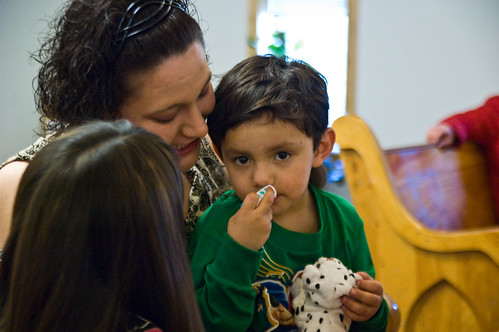 |
| Photo Credit: jeremy.wilburn |
"I have seen with my own eyes or know of houses in Latin America that have been painted 20 times by 20 different short-term teams; fake orphanages in Uganda erected to get Westerners to give money; internet centers in India whose primary purpose is to ask Westerners for money; children in African countries purposefully mutilated by their parents so they would solicit sympathy while they beg; a New England-style church built by a Western team in Cameroon that is never used except when the team comes to visit; and slums filled with big-screen TVs and cell phone towers.
I have seen or know of teams of grandmothers who go to African countries and hold baby orphans for a week every year but don't send a dime to help them otherwise; teams who build houses that never get used; teams that bring the best vacation Bible school material for evangelism when the national church can never bring people back to church unless they have the expensive Western material; teams that lead evangelistic crusades claiming commitments to Christ topping 5,000 every year in the same location with the same people attending."As one that has participated on a number of short-term missions teams, I do believe that these ministry opportunities can have lasting value. I've also experienced the other side as one that has received short-term missionaries into an unfamiliar ministry environment for them. I've dealt firsthand with the challenges of seeking to accommodate these well-meaning but inexperienced missionaries while also trying not to push away the people that will remain long after the missionaries return home.
In order for short-term mission trips to have the type of impact that most of us hope for, it is important for us to examine our motives and intentions in taking part in such endeavors. Before participating in a short-term mission trip, we would do well to ask ourselves several questions. These questions could include the following:
1. Is this trip about me or about the people I'm supposedly going to serve? Do I project the posture of a tourist or that of a servant?
2. Has our team already identified the needs of those we'll be serving without first talking to leaders in that community? Or have we sought their input on what will be most helpful for them?
3. Is our team contributing to an unhealthy dependence on outside resources when the ability to generate those resources might already exist among those we'll be serving?
4. Will we be eating the foods they eat, living in similar housing and respecting their customs and culture? Or will we refuse to identify with them while carrying a "superior" attitude?
5. Do we acknowledge that there are things that the people we'll be meeting have things to teach us and that they can be a blessing to us even as we hope to be a blessing to them?It is true that short-term mission trips can be unhelpful in some circumstances. But that doesn't have to be the case. When we approach others with a humble and teachable heart in which we are willing to serve and not be served, then we are helping to lay the groundwork for a positive experience for both short-term missionaries and those to whom they will be ministering.
To read the rest of Darren Carlson's eye-opening post on the Gospel Coalition blog please click here.


